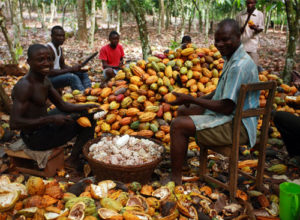Lack of formal contracts increases risk of forced labour along cocoa supply chain – ICI
 The International Cocoa Initiative (ICI), a non-profit foundation, has found that lack of formal contracts increases the risk of forced labour along the cocoa supply chain.
The International Cocoa Initiative (ICI), a non-profit foundation, has found that lack of formal contracts increases the risk of forced labour along the cocoa supply chain.
The Organisation said its assessment of the situation in some cocoa growing communities revealed that many caretaker cocoa farmers engaged in verbal contracts with their farm owners – which were often subjected to breaches.
Speaking at the closing of a three-day training for journalists on Child and Forced Labour in Kumasi in the Ashanti Region, Mr Prince Gyamfi, Deputy Country Director and Programmes Coordinator at ICI, blamed the situation on poverty, illiteracy, and lack of education on the subject.
He explained that for a situation to be considered as forced labour the employee must be engaged in an activity that was involuntary and there must be a threat or penalty if the employee failed to accept the terms of the employer.
“Most of the contracts are verbal contracts so when there is a problem and there are no witnesses, the land owners may take advantage of the caretaker and they are forced to do things that are not agreed,” he said.
Mr Gyamfi advised farmers to always seek witnesses to the verbal agreement, including an influential person in the community who can testify to the agreement in the event of breaches.
“When entering into such verbal agreements, the famers should insist that the witness should not be the wife or relative of the land owner. In most cases, the farmers do not get support when the verbal agreement is breached by the land owner,” he added.
The International Labour Organisation Convention, 1930 (No. 29) defines forced labour as: “all work or service which is exacted from any person under the threat of a penalty and for which the person has not offered himself or herself voluntarily.”
A 2021 data released by the Global Estimates of Modern Slavery indicates that globally, an estimated 27.6 million people are in forced labour, out of which some 2.1 million people in forced labour are in the agriculture sector.
Mr Kofi Yeboah, General Secretary of the Ghana Journalists Association (GJA) and Chairperson of the Professional Development Committee of the GJA, emphasised the need for continuous education on issues relating to forced labour particularly within farming communities to empower caretaker farmers to know their rights under the law.
He encouraged journalists to learn and read about the issue to better inform and educate the public on issues relating to child labour and forced labour.
The workshop organised by the ICI in collaboration with the GJA was aimed at deepening Journalists’ understanding of the concept of forced and child labour and further broaden journalists’ knowledge and skills for writing ethical reports on the subject.
Among the issues discussed at the training were: permissible child work, light work, non-hazardous work, reporting on children, and national, and international laws governing child labour and forced labour.
Source: GNA
